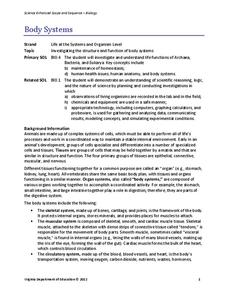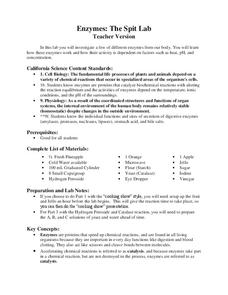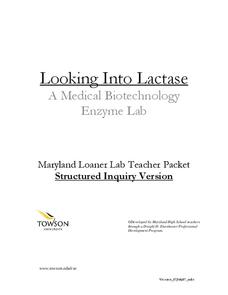Virginia Department of Education
Body Systems
The human body is an amazing thing! Explore the body with your high school class as they investigate each system in detail. They learn components of each organ system and disease processes that can negatively affect general health and...
Curated OER
Organ Systems
Students examine organisms that are composed of tissues, organs, and systems. They dissect a fetal pig and explore the assigned organs systems such as the skeletal, muscular, and circulatory organs. Students identify and explain their...
University of Notre Dame
Safe Science Lab Safety Awareness
Prepare young scientists for the ins and outs of lab safety with a thorough list of symbols, icons, and rules about staying safe during experiments. Additionally, the resource provides several assessment pages for kids to reflect on what...
LABScI
Enzymes: The Spit Lab
Enzymes in our bodies each have a job to do. Learn the factors that affect the activity of some enzymes using the third activity of an informative 12-part biology series. A three-part laboratory activity asks teams to investigate how...
University of Minnesota
Dendritic Spines Lab
This is your brain on drugs ... literally! Your neuroscientists-in-training examine the evidence of drug use on the human brain and how neurons change their connectivity when altered by drugs. They then work together to create testing...
Columbus City Schools
You Can’t Sneeze On This Tissue
Take your class' understanding of cells to the next level... or levels! Demonstrate the levels of organization using a variety of engaging methods. The teacher's guide includes the materials you'll need to execute a flower dissection,...
LABScI
Vision Lab: The Eye
Our bodies have some amazing capabilities, but there are some limitations. Explore the limitations of the human eye through the eighth lab activity in a series of 12 biology lessons. Individuals measure their own peripheral vision and...
Curated OER
Lab Experiments in Nutrition
Looking for authentic hands-on nutritional experiments? High schoolers will perform experiments to test for the presence of vitamin C in several solutions as well as the effect of caffeine on Daphnia. They will also consider the...
American Physiological Society
Effects of Environment on Enzymes
Much like the tale of Humpty Dumpty, proteins, once altered, will never be the same again. Honors and pre-AP biology classes explore the delicate world of enzymes via a Webquest and lab experiment. The teacher's guide contains all...
Curated OER
Sea Horse Body Parts
Students complete a diagram of sea horse body parts. In this sea horse lesson, students review the story Sea Horses A True Book, complete a sea horse diagram using Internet sights to help, make new entries in their KWL charts and work...
Curated OER
Human Body Systems
Learners explore the systems that comprise the human body. For this human physiology lesson, students create a model of the human body and research a disease from a particular system. Learners will then choose to either interview a...
Curated OER
Lab Safety
Young scholars investigate the concept of lab safety using a variety of different activities. The equipment necessary is covered. They draw the different types of lab tools using a graphic organizer.
Curated OER
An Introduction to Primate Biology
Students examine why humans are classified as primates and what features they share with other members of the order. In this investigative lesson students divide into groups and complete their lab station.
Towson University
Looking Into Lactase: Structured Inquiry
Why is lactase important? Biology scholars explore enzyme function in a structured inquiry lab. The activity tasks lab groups with observing how temperature and pH affect enzyme activity, as well as determining which milk products...
Curated OER
Applied Science-Techonology Post Lab
Students study animals. In this machines and tools lesson, students study animals to figure out how various tools were created for humans to use. They are read the story An Elephant Never Forgets its Snorkel to help spark ideas. They...
Virginia Department of Education
Heat Transfer and Heat Capacity
It's time to increase the heat! Young chemists demonstrate heat transfer and heat capacity in an activity-packed lab, showing the transitions between solid, liquid, and gaseous phases of materials. Individuals plot data as the changes...
Curated OER
Plankton in the Air
Here is a lab activity adequate for use with any full lesson on environmental factors that shape animal adaptations or marine animal characteristics. Pupils will discuss the role plankton plays in the environment and filter-feeding...
Curated OER
Insects?
Can you tell the difference between a bug and an insect? Aren't they the exact same thing? Let your learners explore, identify, classify, and document the differences they see in bugs and insects. The activity sheet suggests several...
Curated OER
Simulation of Laparoscopic Surgery Lab
Students, having learned how to manipulate the instruments, insert the instruments into the "ports" of the plastic membrane, trying to clip, cut, staple the sponge organ according to the function of the instrument.
Curated OER
Life Cycle: Diversity in a Balance
In this life cycle workbook, 3rd graders complete several different activities in which they analyze different invertebrates, identify arthropods, examine human biology and plants, and study natural environments. 20 different activities...
Curated OER
Salt Marshes And Their Inhabitants
Students investigate the ecosystem of the salt marshes. This is done in order to develop an appreciation for this type of environment. They conduct research using a variety of resources. Students are given samples of different organisms...
Curated OER
Eutrophication Lab
Learners examine the effects of detergents and fertilizers on aquatic life and describe algae. Students define the term eutrophication as the process by which a body of water, such as a pond, lake, stream, or river, has a sudden increase...
Baylor College
Can Nutrients in Water Cause Harm?
Ecology candidates culture pond water organisms over a few days time, then they experiment to find out how increasing nutrients affects the population. As part of a unit on water, this exploration gives your class an understanding of how...
LABScI
The Digestive System: Where Does Food Go?
Would you believe that your digestive system stretches to five times your height?! Help your pupils to understand this relationship as they work through the laboratory exercise. The first instructional activity of a 12-part series is a...

























